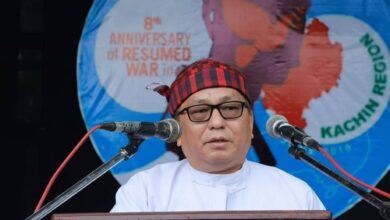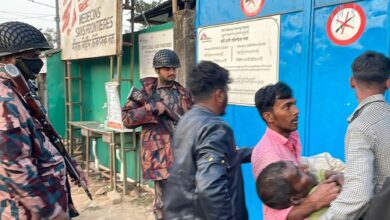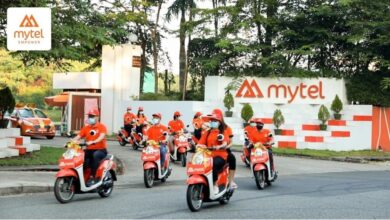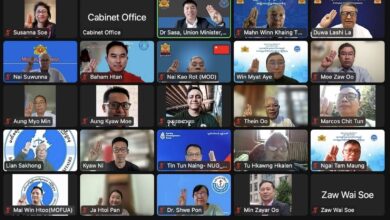
On a rain-soaked morning in downtown Yangon in mid-May, five young men busied themselves in a small room above Latha road, which was free of the usual noise and crowds thanks to the Covid-19 lockdown.
The men were working on computers and digital cameras to edit a video outlining the People’s Pioneer Party’s (PPP) Covid-19 economic recovery plan.
The room serves as the new party’s headquarters, and the men are its social media team.
Officially, parties cannot begin campaigning until 60 days prior to the election. In May the Union Election Commission (UEC) confirmed this year’s elections will take place in November, though it has yet to set a specific date.
Still, several parties are already beginning to make their presences felt online, where a disproportionate share of campaigning will take place as Covid-19 restrictions rule out large public gatherings.
Social media is shaping up to be the main battleground of this year’s election, in a country that has only held one national poll deemed legitimate in living memory and is relatively new to the internet.
So election officials must grapple with several new questions: What constitutes campaign activity online? How should spending on social media campaigns be regulated? And what about the people who are still offline?
A race for followers
More than 34m of Myanmar’s 53.7m citizens were eligible to vote in 2015, and the UEC expects that number to increase to 40m this year.
Over 22m people in Myanmar use social media, which they see as virtually synonymous with Facebook, according to the Milan-based internet research group We Are Social.
Of the 97 political parties the UEC has already approved to run in 2020, 64 are active on Facebook. Thirty nine of those are verified by Facebook with a signature blue check.
With over 2.7m followers, the NLD’s Facebook page commands far more online attention than any other party page. Its closest rival, the military proxy Union Solidarity and Development Party (USDP), has just over 330,000 followers on its official page, though it also uses the pages of party chairman Than Htay and of its women’s and farmer’s committees to push out information.
The National Development Party, led by Nay Zin Latt, who was previously an advisor to former president Thein Sein, has more than 320,000 followers. The PPP has 180,000.
Buying influence
Some politicians and election watchers have said they are concerned about well-funded campaigns gaining an unfair advantage online.
The USDP has paid to boost both its women’s and farmer’s committee pages to reach more people, though it is unclear how much they’ve spent on this.
The women’s committee boosted a June 6 post of a picture of Than Htay with the caption, “We will have Section 261 amended so that state and regional parliaments can appoint their own chief ministers instead of the president.” The post has more than 3,000 likes and 300 shares.
The NLD forbids purchasing Facebook boosts for its pages, NLD central information committee member Kyi Toe told Myanmar Now. The party feels the practice disadvantages smaller, less well-funded parties.
Nay Phone Latt, an NLD MP for Thingangyun township, said wealthy parliamentary candidates could gain an unfair advantage by outspending their rivals on boosts and hiring staffers to push out false information from fake accounts.
He called on social media companies, the UEC and the parties themselves to create new campaign policies to address these concerns.
Aung Min Khant – the 34-year-old leader of the PPP’s media team – agreed.
The party is largely composed of tycoons and high-profile economists. Its founder and chairperson is Dagon township MP Thet Thet Khine, a former NLD member and the owner of the Golden Palace Gold and Jewelry Center. Many think this means the PPP has deep pockets for online campaigning, but, Aung Min Khant said, this is not the case.
“We don’t have tens of millions [of kyat],” he told Myanmar Now. “We can’t buy the ads a large company can. We can only afford a few million, no more.”
Still, he said, Facebook is the best way to gain name recognition in the Covid-19 era.
For many smaller and more rural parties, however, much campaigning will still have to be done in person.
The Taunggyi-based Shan Nationalities Democratic Party (SNDP) page has more than 30,000 followers and posts in both Burmese and Shan languages.
While online campaigning works for urban voters, SNDP joint secretary Sai Kyaw Nyunt told Myanmar Now, it may not reach villagers.
“The party can’t speak on social media only. We need to go to the voters where they actually are,” he said.
The decision is also financial: smaller parties often mean smaller budgets.
“Big parties can spend more for online ads. We can’t compete there,” Sai Kyaw Nyut said. “We need to focus on real political action to stand out.”
Thin line
Further complicating the matter is the thin line between a party’s regular social media use and an official campaign post.
USDP spokesperson Than Htun Oo said that while the ruling NLD may not boost its posts, state-run social media coverage of its Covid-19 response – including the Facebook posts of state counsellor Aung San Suu Kyi – looks a lot like campaigning.
“Only they know if this is fair or not, but it’s one of the questions that must be asked if we are to ensure a fair election,” he said.
Similar concerns arose over public officials’ conduct during elections in 2015, when the USDP was in power.
President and vice presidents are constitutionally barred from campaigning for their parties while in office.
In 2015, then-president Thein Sein made an official visit to a dam project near Meikhtila, in Mandalay region, just weeks before the election. Many saw the laudatory state newspaper coverage that followed the visits as campaign propaganda.
The Union Betterment Party (UBP), led by former general Shwe Mann, has been holding frequent live discussions both on its official page and on Shwe Mann’s personal Facebook page.
Those discussions have focused on the national economy, but also the charitable acts the party has been doing.
The party’s page has more than 47,000 followers. A party leader who asked to remain anonymous told Myanmar Now the UBP will not form an official campaign media team until the election date is announced.
Tracking spending
In theory, there are already checks in place to allay these concerns. The UEC has capped campaign spending at 10m kyat, while Facebook classifies its ads as either commercial or political.
But Nay Phone Latt is worried some parties may buy ads labelled as commercial to get around the campaign spending cap, since Facebook does not release information on its commercial ad sales.
But UEC spokesperson Myint Naing said at a press conference in Naypyitaw earlier this month the commission considers all online spending part of a campaign’s expenditures, so the commercial-political distinction shouldn’t matter.
“The form-20 includes an ‘other’ expense category, so all spending not otherwise defined should be included in that,” Myint Naing said, referring to the form all parties must use to declare expenditures.
He said the commission does not have separate policies that are online-specific.
A UEC member who asked for anonymity said any candidate or campaign that does not include all spending on their form-20 can be charged under election laws, but only if a complaint is filed against them.
“They must include all the expenses related to their campaign. If not, and if someone lodges a complaint, they’ll be in trouble,” he said.



